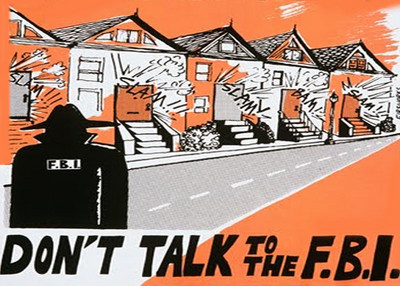It crosses the line and should be taken down. But it's wrong to call attention to a poster used by the Council on American-Islamic Relations (CAIR) to promote an upcoming meeting about alleged FBI abuses in terrorism-related investigations, a group spokesman says.
The Investigative Project on Terrorism broke the story about the poster Wednesday. Published on the group's San Francisco chapter website, it features an animated image of a skulking "FBI" agent in a hat and overcoat lurking outside a row of homes as their front doors slam shut. "Build a Wall of Resistance," it says, "Don't Talk to the FBI."
Even while acknowledging the poster is inappropriate, CAIR national spokesman Ibrahim Hooper blamed the messenger.
"The entire American-Muslim community is under the microscope right now with a cottage industry of Muslim bashers," Hooper told Fox News Thursday. "We're used to this kind of attack by the Islamophobic hate machine and in this case there is some justification in terms of the possibility of misinterpretation of this poster."
The event is called "Know Your Rights and Defend Our Communities from Grand Juries," and is in response to an ongoing investigation into possible terror support by groups in Chicago and Minneapolis. CAIR-Chicago Executive Director Ahmed Rehab dismissed the investigation as "a waste of taxpayer dollars."
On Thursday, Hooper disavowed any CAIR role in creating the poster, saying he didn't know who made it and that CAIR is among many sponsors of the event promoted. CAIR has organized "Know Your Rights" seminars for years. The message of never talking to the FBI without legal counsel is hammered at each event.
A group of Somali families demonstrated outside a CAIR event in Minneapolis in June 2009, angered that the message might hinder an investigation into a group of 20 young men who were believed to have gone to Somalia to join the terrorist group al-Shabaab.
In 2008, the FBI broke off formal communication with CAIR and its chapters, citing exhibits in a terror-financing trial that linked CAIR founders to a Hamas-support network in America. CAIR's creation was an outgrowth of that effort, an FBI agent said, reading from transcripts of a secret 1993 meeting of Hamas supporters.
Despite a pretty thick record to the contrary from the organization itself and its officials, Hooper claimed CAIR has "a consistent policy of positive and constructive engagement with law enforcement officials."


